Unit 6 I’m watching TV 期末知识归纳+综合能力提升(含答案)
文档属性
| 名称 | Unit 6 I’m watching TV 期末知识归纳+综合能力提升(含答案) | 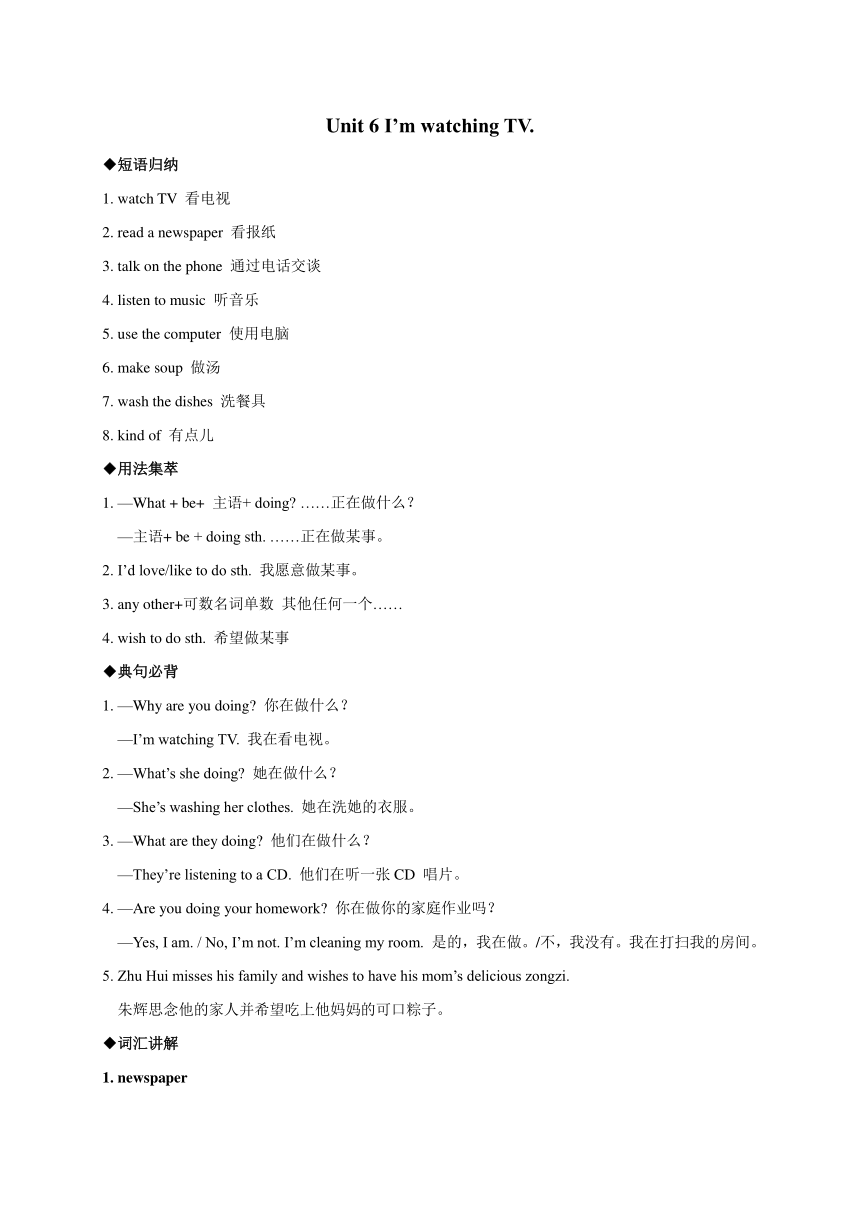 | |
| 格式 | zip | ||
| 文件大小 | 22.0KB | ||
| 资源类型 | 教案 | ||
| 版本资源 | 人教新目标(Go for it)版 | ||
| 科目 | 英语 | ||
| 更新时间 | 2020-06-15 20:31:57 | ||
图片预览

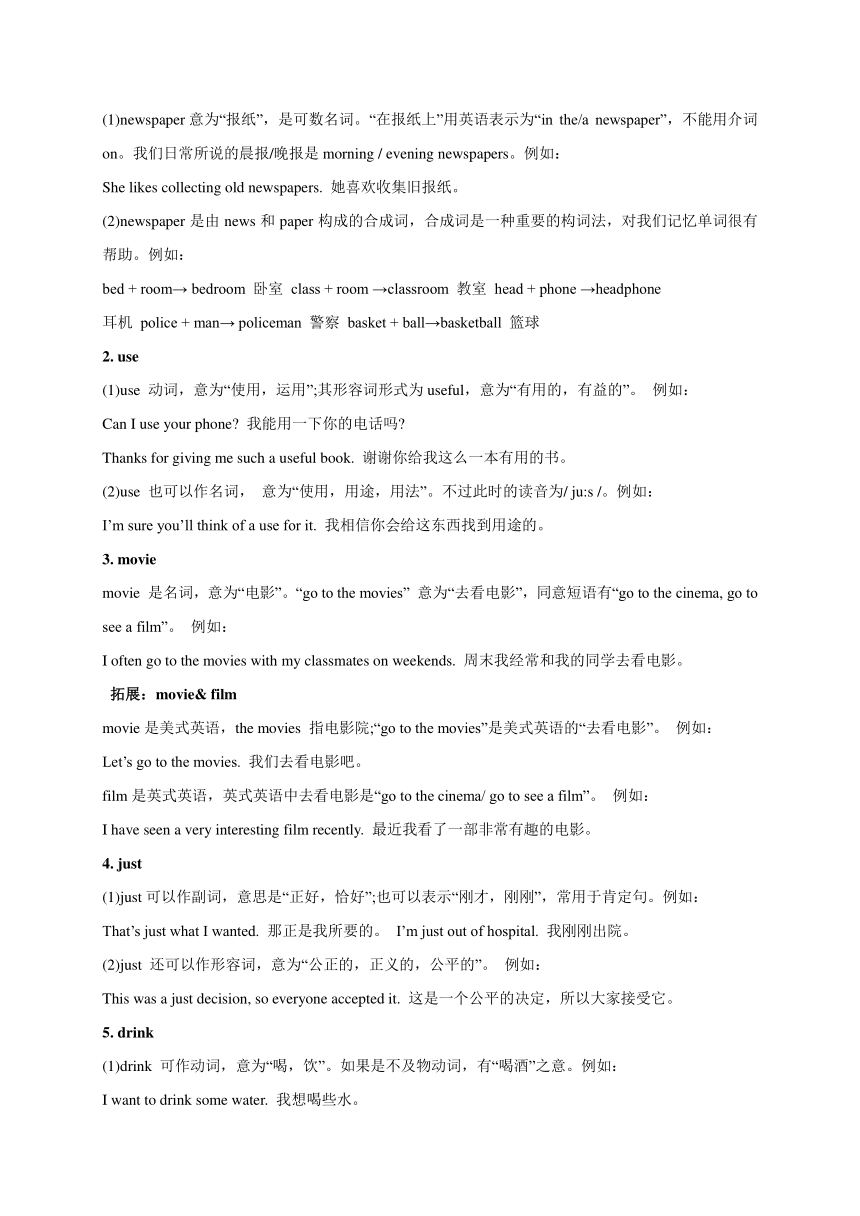
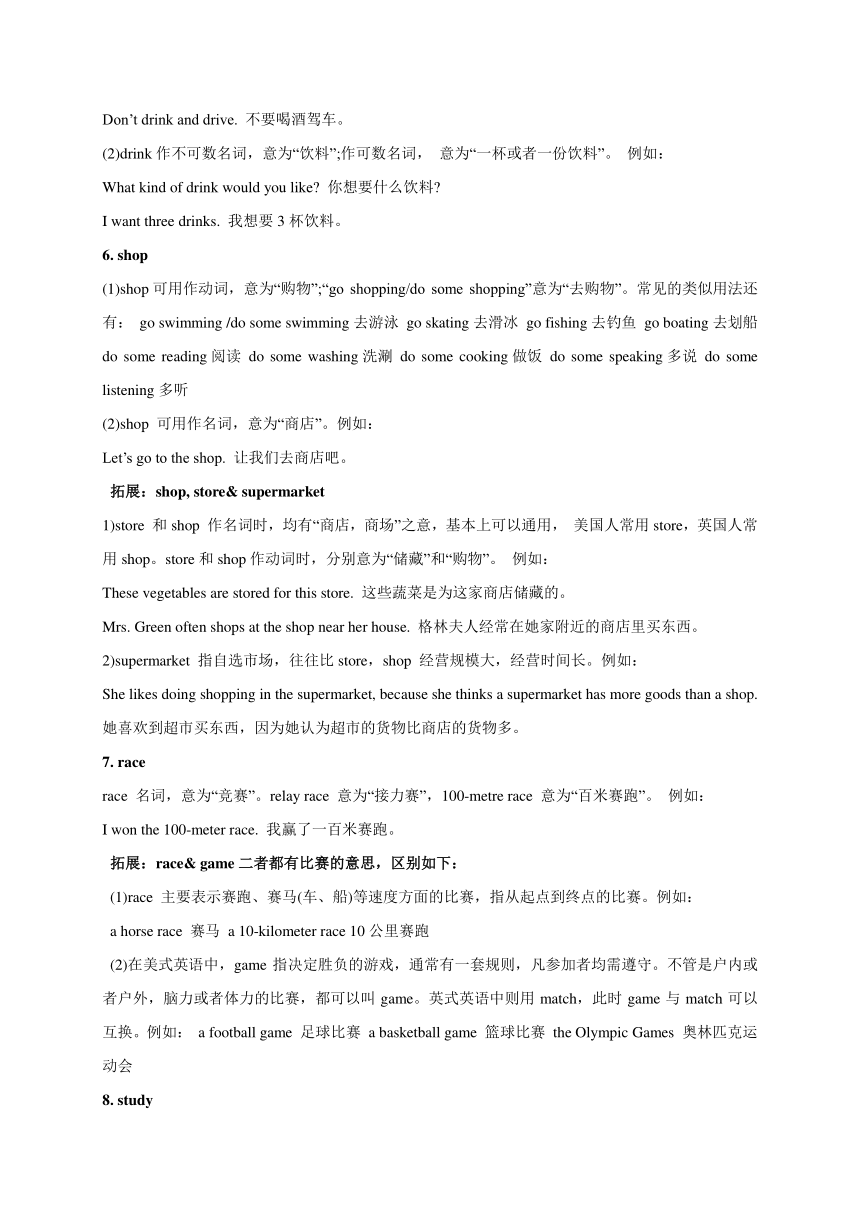
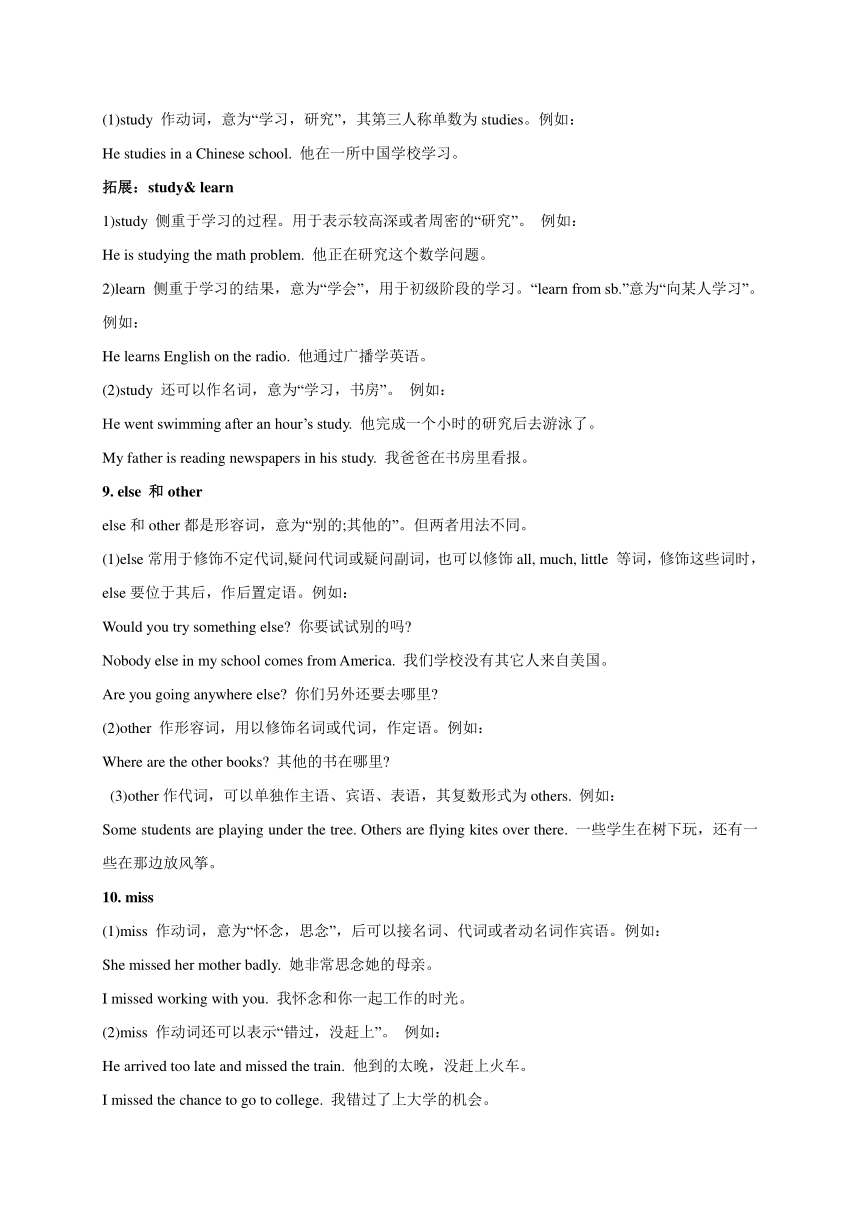
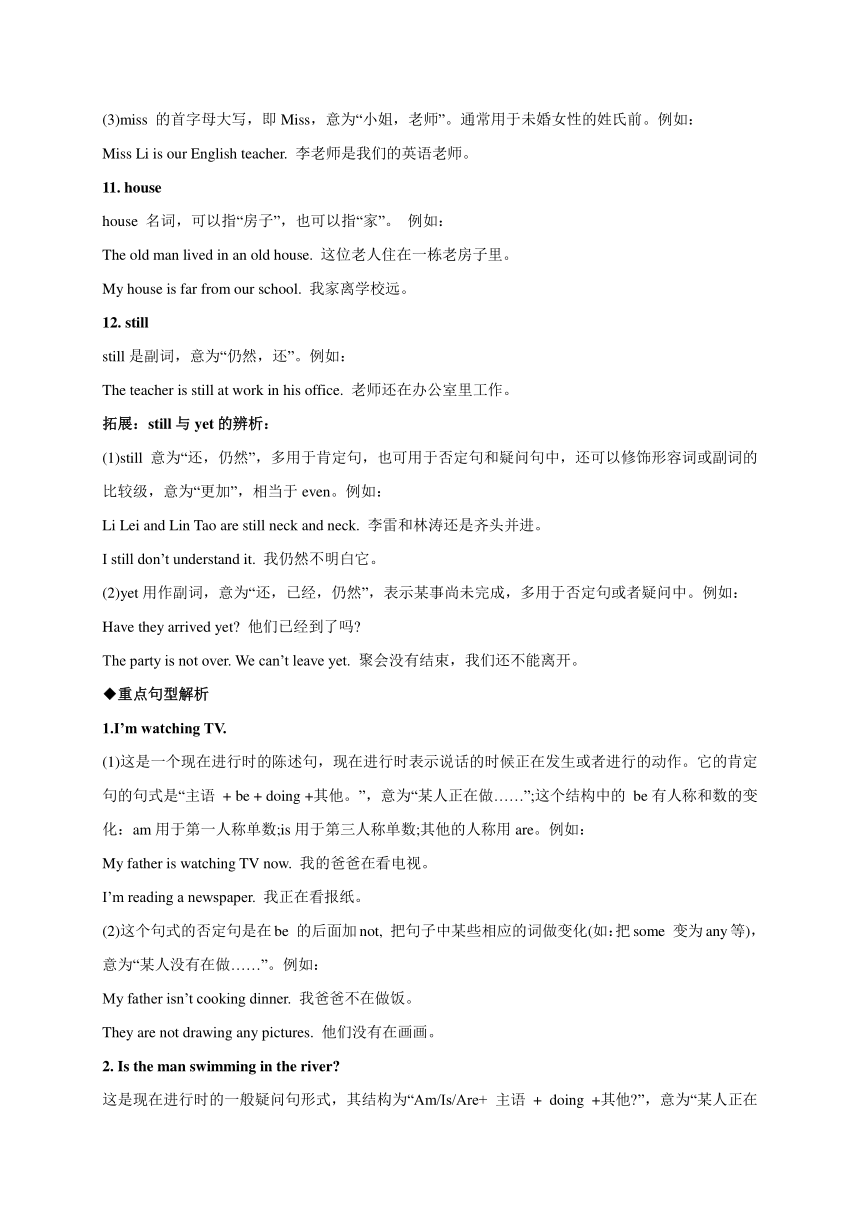
文档简介
Unit
6
I’m
watching
TV.
◆短语归纳
1.
watch
TV
看电视
2.
read
a
newspaper
看报纸
3.
talk
on
the
phone
通过电话交谈
4.
listen
to
music
听音乐
5.
use
the
computer
使用电脑
6.
make
soup
做汤
7.
wash
the
dishes
洗餐具
8.
kind
of
有点儿
◆用法集萃
1.
—What
+
be+
主语+
doing?
……正在做什么?
—主语+
be
+
doing
sth.
……正在做某事。
2.
I’d
love/like
to
do
sth.
我愿意做某事。
3.
any
other+可数名词单数
其他任何一个……
4.
wish
to
do
sth.
希望做某事
◆典句必背
1.
—Why
are
you
doing?
你在做什么?
—I’m
watching
TV.
我在看电视。
2.
—What’s
she
doing?
她在做什么?
—She’s
washing
her
clothes.
她在洗她的衣服。
3.
—What
are
they
doing?
他们在做什么?
—They’re
listening
to
a
CD.
他们在听一张CD
唱片。
4.
—Are
you
doing
your
homework?
你在做你的家庭作业吗?
—Yes,
I
am.
/
No,
I’m
not.
I’m
cleaning
my
room.
是的,我在做。/不,我没有。我在打扫我的房间。
5.
Zhu
Hui
misses
his
family
and
wishes
to
have
his
mom’s
delicious
zongzi.
朱辉思念他的家人并希望吃上他妈妈的可口粽子。
◆词汇讲解
1.
newspaper
(1)newspaper意为“报纸”,是可数名词。“在报纸上”用英语表示为“in
the/a
newspaper”,不能用介词on。我们日常所说的晨报/晚报是morning
/
evening
newspapers。例如:
She
likes
collecting
old
newspapers.
她喜欢收集旧报纸。
(2)newspaper是由news和paper构成的合成词,合成词是一种重要的构词法,对我们记忆单词很有帮助。例如:
bed
+
room→
bedroom
卧室
class
+
room
→classroom
教室
head
+
phone
→headphone
耳机
police
+
man→
policeman
警察
basket
+
ball→basketball
篮球
2.
use
(1)use
动词,意为“使用,运用”;其形容词形式为useful,意为“有用的,有益的”。
例如:
Can
I
use
your
phone?
我能用一下你的电话吗?
Thanks
for
giving
me
such
a
useful
book.
谢谢你给我这么一本有用的书。
(2)use
也可以作名词,
意为“使用,用途,用法”。不过此时的读音为/
ju:s
/。例如:
I’m
sure
you’ll
think
of
a
use
for
it.
我相信你会给这东西找到用途的。
3.
movie
movie
是名词,意为“电影”。“go
to
the
movies”
意为“去看电影”,同意短语有“go
to
the
cinema,
go
to
see
a
film”。
例如:
I
often
go
to
the
movies
with
my
classmates
on
weekends.
周末我经常和我的同学去看电影。
拓展:movie&
film
movie是美式英语,the
movies
指电影院;“go
to
the
movies”是美式英语的“去看电影”。
例如:
Let’s
go
to
the
movies.
我们去看电影吧。
film是英式英语,英式英语中去看电影是“go
to
the
cinema/
go
to
see
a
film”。
例如:
I
have
seen
a
very
interesting
film
recently.
最近我看了一部非常有趣的电影。
4.
just
(1)just可以作副词,意思是“正好,恰好”;也可以表示“刚才,刚刚”,常用于肯定句。例如:
That’s
just
what
I
wanted.
那正是我所要的。
I’m
just
out
of
hospital.
我刚刚出院。
(2)just
还可以作形容词,意为“公正的,正义的,公平的”。
例如:
This
was
a
just
decision,
so
everyone
accepted
it.
这是一个公平的决定,所以大家接受它。
5.
drink
(1)drink
可作动词,意为“喝,饮”。如果是不及物动词,有“喝酒”之意。例如:
I
want
to
drink
some
water.
我想喝些水。
Don’t
drink
and
drive.
不要喝酒驾车。
(2)drink作不可数名词,意为“饮料”;作可数名词,
意为“一杯或者一份饮料”。
例如:
What
kind
of
drink
would
you
like?
你想要什么饮料?
I
want
three
drinks.
我想要3杯饮料。
6.
shop
(1)shop可用作动词,意为“购物”;“go
shopping/do
some
shopping”意为“去购物”。常见的类似用法还有:
go
swimming
/do
some
swimming去游泳
go
skating去滑冰
go
fishing去钓鱼
go
boating去划船
do
some
reading阅读
do
some
washing洗涮
do
some
cooking做饭
do
some
speaking多说
do
some
listening多听
(2)shop
可用作名词,意为“商店”。例如:
Let’s
go
to
the
shop.
让我们去商店吧。
拓展:shop,
store&
supermarket
1)store
和shop
作名词时,均有“商店,商场”之意,基本上可以通用,
美国人常用store,英国人常用shop。store和shop作动词时,分别意为“储藏”和“购物”。
例如:
These
vegetables
are
stored
for
this
store.
这些蔬菜是为这家商店储藏的。
Mrs.
Green
often
shops
at
the
shop
near
her
house.
格林夫人经常在她家附近的商店里买东西。
2)supermarket
指自选市场,往往比store,shop
经营规模大,经营时间长。例如:
She
likes
doing
shopping
in
the
supermarket,
because
she
thinks
a
supermarket
has
more
goods
than
a
shop.
她喜欢到超市买东西,因为她认为超市的货物比商店的货物多。
7.
race
race
名词,意为“竞赛”。relay
race
意为“接力赛”,100-metre
race
意为“百米赛跑”。
例如:
I
won
the
100-meter
race.
我赢了一百米赛跑。
拓展:race&
game二者都有比赛的意思,区别如下:
(1)race
主要表示赛跑、赛马(车、船)等速度方面的比赛,指从起点到终点的比赛。例如:
a
horse
race
赛马
a
10-kilometer
race
10公里赛跑
(2)在美式英语中,game指决定胜负的游戏,通常有一套规则,凡参加者均需遵守。不管是户内或者户外,脑力或者体力的比赛,都可以叫game。英式英语中则用match,此时game与match可以互换。例如:
a
football
game
足球比赛
a
basketball
game
篮球比赛
the
Olympic
Games
奥林匹克运动会
8.
study
(1)study
作动词,意为“学习,研究”,其第三人称单数为studies。例如:
He
studies
in
a
Chinese
school.
他在一所中国学校学习。
拓展:study&
learn
1)study
侧重于学习的过程。用于表示较高深或者周密的“研究”。
例如:
He
is
studying
the
math
problem.
他正在研究这个数学问题。
2)learn
侧重于学习的结果,意为“学会”,用于初级阶段的学习。“learn
from
sb.”意为“向某人学习”。例如:
He
learns
English
on
the
radio.
他通过广播学英语。
(2)study
还可以作名词,意为“学习,书房”。
例如:
He
went
swimming
after
an
hour’s
study.
他完成一个小时的研究后去游泳了。
My
father
is
reading
newspapers
in
his
study.
我爸爸在书房里看报。
9.
else
和other
else和other都是形容词,意为“别的;其他的”。但两者用法不同。
(1)else常用于修饰不定代词,疑问代词或疑问副词,也可以修饰all,
much,
little
等词,修饰这些词时,else要位于其后,作后置定语。例如:
Would
you
try
something
else?
你要试试别的吗?
Nobody
else
in
my
school
comes
from
America.
我们学校没有其它人来自美国。
Are
you
going
anywhere
else?
你们另外还要去哪里?
(2)other
作形容词,用以修饰名词或代词,作定语。例如:
Where
are
the
other
books?
其他的书在哪里?
(3)other作代词,可以单独作主语、宾语、表语,其复数形式为others.
例如:
Some
students
are
playing
under
the
tree.
Others
are
flying
kites
over
there.
一些学生在树下玩,还有一些在那边放风筝。
10.
miss
(1)miss
作动词,意为“怀念,思念”,后可以接名词、代词或者动名词作宾语。例如:
She
missed
her
mother
badly.
她非常思念她的母亲。
I
missed
working
with
you.
我怀念和你一起工作的时光。
(2)miss
作动词还可以表示“错过,没赶上”。
例如:
He
arrived
too
late
and
missed
the
train.
他到的太晚,没赶上火车。
I
missed
the
chance
to
go
to
college.
我错过了上大学的机会。
(3)miss
的首字母大写,即Miss,意为“小姐,老师”。通常用于未婚女性的姓氏前。例如:
Miss
Li
is
our
English
teacher.
李老师是我们的英语老师。
11.
house
house
名词,可以指“房子”,也可以指“家”。
例如:
The
old
man
lived
in
an
old
house.
这位老人住在一栋老房子里。
My
house
is
far
from
our
school.
我家离学校远。
12.
still
still是副词,意为“仍然,还”。例如:
The
teacher
is
still
at
work
in
his
office.
老师还在办公室里工作。
拓展:still与yet的辨析:
(1)still意为“还,仍然”,多用于肯定句,也可用于否定句和疑问句中,还可以修饰形容词或副词的比较级,意为“更加”,相当于even。例如:
Li
Lei
and
Lin
Tao
are
still
neck
and
neck.
李雷和林涛还是齐头并进。
I
still
don’t
understand
it.
我仍然不明白它。
(2)yet用作副词,意为“还,已经,仍然”,表示某事尚未完成,多用于否定句或者疑问中。例如:
Have
they
arrived
yet?
他们已经到了吗?
The
party
is
not
over.
We
can’t
leave
yet.
聚会没有结束,我们还不能离开。
◆重点句型解析
1.I’m
watching
TV.
(1)这是一个现在进行时的陈述句,现在进行时表示说话的时候正在发生或者进行的动作。它的肯定句的句式是“主语
+
be
+
doing
+其他。”,意为“某人正在做……”;这个结构中的
be有人称和数的变化:am用于第一人称单数;is用于第三人称单数;其他的人称用are。例如:
My
father
is
watching
TV
now.
我的爸爸在看电视。
I’m
reading
a
newspaper.
我正在看报纸。
(2)这个句式的否定句是在be
的后面加not,
把句子中某些相应的词做变化(如:把some
变为any等),意为“某人没有在做……”。例如:
My
father
isn’t
cooking
dinner.
我爸爸不在做饭。
They
are
not
drawing
any
pictures.
他们没有在画画。
2.
Is
the
man
swimming
in
the
river?
这是现在进行时的一般疑问句形式,其结构为“Am/Is/Are+
主语
+
doing
+其他?”,意为“某人正在干……吗?”。肯定回答用:Yes,
主语
+
be.
否定回答用:No,
主语+be
+
not.
例如:
-Are
you
reading
books?
你正在读书吗?
Yes,
I
am.
是的,我在读。/-No,
I
am
not.
不,我没有读。
3.
What
are
you
doing?
这是一个现在进行时的特殊疑问句,询问别人正在做什么。它的结构是“特殊疑问词+be+主语+doing+其他+?”。对于特殊疑问句的回答,要根据实际情况来定。例如:
—What
is
your
mother
doing?
你妈妈在做什么?
—She
is
watering
the
flowers.
她在浇花。
4.
I’d
love
to.
I’d
love
to是由“I
would
love
to…”缩写而来,常用来回答“Would
you
like
to…?”提出的问句。其意与“I
would
like
to…”相近,均表示“我想要……”。would
love
/
like
后只接名词或动词不定式。若去掉了would,表示“我喜欢……”,其后接名词、动词不定式或动名词。
注意:I’d
love
/like
to.的to不能省略。例如:
—
Would
you
love
to
go
to
the
movies
with
me?你愿意和我一起去看电影吗?
—
Yes,
I’d
love
to.
是的,我很愿意。
5.
Do
you
want
to
join
me
for
dinner?
join是动词,意为“参加,加入”。宾语有以下几种形式:
(1)join
+
表示团体或组织的名词,join意为“加入(某团体),成为……(成员)”。例如:
Yao
Ming
joined
the
NBA.
姚明加入了NBA。
(2)join
+
指人的名词或代词,join意为“加入……之中”。例如:
Will
you
join
us
for
lunch?和我们一起吃午饭好吗?
(3)join
+in
+
活动类名词,join
in意为“参加(活动)”。例如:
Can
you
join
in
the
game?你能参加这个游戏吗?
拓展:join;
join
in和take
part
in
的辨析:
(1)
join指加入某党派、某组织或某社会团体,以及参军等,并成为其中一员。例如:
I
joined
the
army
in
1996.
我是1996年参军的。
(2)join
in指参加某项比赛或活动,常用于口语中,也可用于join
sb
in
(doing)
sth
意为“加入……(做)……”。例如:
May
I
join
in
the
football
match?我可以参加这场足球比赛吗?
(3)take
part
in指参加群众性的活动、会议、劳动、游行等,往往指参加者持有积极的态度,起一定作用,有时与join
in互换。例如:
I
didn’t
take
part
in
the
sports
meeting
yesterday
because
I
was
ill.
我没有参加昨天的运动会,因为我病了。
6.
Zhu
Hui…wishes
to
have
his
mom’s
delicious
zongzi.
wish
在句中作动词,意为“希望”,后面可接名词、代词或动词。“wish
to
do”表示“希望做……”。此时,也可以和“hope
to
do”互换。例如:
I
wish
(hope)
to
have
a
new
computer.我希望有一台新电脑。
拓展:wish
作动词时的其他常见用法:
(1)wish
sb.
to
do
sth.
意为“希望某人做某事”,例如:
He
wishes
us
to
stay
here.
他希望我们留在这儿。
(2)wish
sb.
sth.
意为“祝愿某人……”,例如:
We
wish
her
a
happy
birthday.
我们祝她生日快乐。
(3)wish
+
that从句
意为“但愿……,要是……就好了”,例如:
I
wish
I
were
young
again.
要是我能返老还童就好了。
综合能力提升
I.
用括号中所给单词的适当形式填空。
1.
He
often
_______(read)
a
newspaper
in
the
living
room.
2.
Li
Ming
is______
(study)
for
a
test
now.
3.
The
mother
______
(miss)
her
daughter
very
much.
4.
Do
you
like
watching
boat
______
(
race
)
on
TV?
5.
Listen!
Kate
______
(sing)
in
the
next
room.
6.
Look!
Two
boys
_____
(play)
basketball
over
there.
7.
She
______
(swim)
at
the
pool
now.
8.
Tom
______
(write)
a
new
novel
these
days.
9.
-What’s
your
sister
doing?
-She
______
(clean)
her
room.
10.
The
giraffes
are
very
______
(friend)
and
interesting.
II.选词填空。
1.
School
is______
not
over,
the
students
can’t
leave
______.
(yet,
still)
2.
The
old
man
lives
in
a
big
_______
alone.
(home,
family,
house)
3.
I
______
at
No.
1
Middle
School.
(study,
learn)
4.
He
won
the
100-metere
_______.
(game,
race)
5.
Please
take
______
book
you
like.
(some,
any)
III根据对话内容补全对话,每空一词。
A:
Hello,John.
1
are
you
doing?
B:
Hi,Bob.
I’m
doing
my
homework.
A:
Do
you
want
to
2
tennis?
B:
That
3
boring.
I
4
like
tennis.
A:
What
about
5
at
the
pool?
It’s
really
hot
today.
B:
Great!
6
do
you
want
to
go?
A:
Let’s
go
7
four
o’clock
p.
m.
B:
OK.
A:
8
Tina
there?
What’s
she
doing?
B:
Yes,she
is.
She’s
watching
TV.
The
TV
9
is
interesting.
A:
Does
she
want
to
go
10
us?
B:
I
don’t
think
so.
1.____
2.____
3.____
4.____
5.____
6.____
7.____
8.____
9.____
10.___
IV.句型转换,每空一词。
1.
Daming
can
join
the
Sports
Club.
(对划线部分提问)
_______
club______
Daming
join?
2.
I’m
doing
my
homework.
(变为一般疑问句)
_______
you
doing
______
homework?
3.
Alice
is
writing
a
letter.
(对划线部分提问)
______
______
Alice
_______?
4.
She
often
plays
the
violin.
(用now
替换
often)
She
______
______
the
violin
now.
5.
Li
Lei
does
his
homework
in
the
evening.
(变为否定句)
Li
Lei______
______
his
homework
in
the
evening.
6.
The
students
are
waiting
for
their
teachers.(就划线部分提问)
______
are
the
students
______
for?
7.
The
girls
are
watching
a
movie
at
the
cinema.
(就划线部分提问)
______
_______
the
girls
_______
a
movie?
8.
He
wants
to
go
to
the
shop.
(就划线部分提问)
______
does
he
_______
to
_______?
9.
He
is
reading
a
book.
(改为否定句)He
_______
______
a
book.
10.
-Is
she
opening
the
door?(作肯定回答)-Yes,
______
______.
V.单项填空
1.
—Would
you
like
to
go
to
the
movies
with
me?
—That
sounds____
.
A.
delicious
B.
well
C.
good
D.
boring
2.
—Is
he
_______
a
movie
on
TV?
—No,he’s
_______
an
e
mail.
A.
reading;writing
B.
seeing;writing
C.
seeing;watching
D.
looking;reading
3.
Tom
has
sports______
the
afternoon.
Jack
has
sports
_______
Wednesday
and
Friday
afternoons.
A./;on
B.
on;on
C.
in;on
D.
on;/
4.
I
am
playing
_______
piano
right
now
while
he
is
playing
_______
basketball.
A.
the;/
B./;/
C./;the
D.
the;the
5.
Tom
is
good
______
football.
He
is
_______
the
football
team.
A.
in;on
B.
at;on
C.
on;in
D.
in;in
6.
—Is
David
playing
computer
games?
—
_________
.
A.
Yes,he
is
B.
No,he
is
C.
Yes,he
does
D.
No,he
doesn’t
7.
Here
________
some
photos
of
my
family.
A.
is
B.
are
C.
has
D.have
8.
I
______
to
go
shopping
now.
Do
you
go
with
me?
A.
want
B.
wants
C.
to
want
D.
am
wanting
9.
Thanks
for
_______
me,John.
A.
help
B.
helping
C.
to
help
D.
helps
10.
He
is
studying
_______
a
test.
A.
with
B.
for
C.
on
D.
of
VI.完形填空(每小题1.5分,满分15分)
Tony
and
Bill
are
in
the
same
school,
1
they
are
in
different
classes.
Their
favorite
2
is
Chinese.
They
3
Chinese
is
very
interesting.
They
go
to
school
on
weekdays.They
come
to
school
4
7:00
in
the
morning.
Today
is
Tuesday.
Tony
and
Bill
are
in
their
own
(自己的)
classrooms.
Tony
5
an
English
class.
Look!He
is
talking
6
his
English
teacher
in
English.
Bill
is
having
a
Chinese
class.
His
teacher
is
talking
7
Beijing
Opera
with
them.
The
students
are
looking
at
their
teachers.
They
8
carefully
(认真地).But
one
of
Tony’s
classmates
9
a
book,because
he
isn’t
good
at
English
and
he
10
English.
1.A.but
B.
and
C.
or
D.
because
2.A.sport
B.
language
C.
country
D.
subject
3.A.say
B.
speak
C.
tell
D.
talk
4.A.in
B.
on
C.
at
D.
about
5.A.have
B.
is
hasing
C.
has
D.
is
having
6.A.at
B.
to
C.
for
D.
of
7.A.to
B.
in
C.
about
D.
at
8.A.listen
to
B.listening
to
C.are
listening
D.are
listening
to
9.A.are
reading
B.is
reading
C.reads
D.read
10.A.likes
B.doesn’t
like
C.don’t
like
D.isn’t
liking
VII.
阅读理解
It’s
late
at
night.
Martin
is
sitting
on
his
bed
and
he’s
looking
at
his
clock.
His
neighbors
are
making
a
lot
of
noises
and
Arthur
is
very
angry.
The
people
in
Apartment
2
are
dancing.
The
man
in
Apartment
3
is
singing.
The
woman
in
Apartment
4
is
practising
the
violin.
The
teenagers
in
Apartment
5
are
listening
to
loud
rock
music(摇滚乐).The
dog
in
Apartment
6
is
barking.
And
the
people
in
Apartment
7
are
having
a
big
argument(争吵).
It’s
very
late
and
Martin
is
tired
and
angry.
What
a
terrible
night!
1.
Martin’s
neighbors
are________
.
A.
noisy
B.
angry
C.
singing
D.
sleeping
2.
The
man
in
Apartment
3
is________
.
A.
painting
his
apartment
B.
singing
C.
fixing
the
apartment
D.
moving
3.
The
noisy
people
in
Apartment
5
are
________
.
A.
young
B.
old
C.
women
D.
men
4.
The
dog
in
Apartment
6
isn’t
________
.
A.
sleeping
B.
making
noise
C.
noisy
D.
friendly
5.
The
woman
in
Apartment
4
is
________
.
A.
playing
cards
B.
practising
the
violin
C.
playing
computers
D.
playing
balls
VIII.
书面表达
假设你叫魏梅,根据下面提示给你的朋友Helen
写一张明信片,介绍一下你和你的家人正在做什么,不少于60词。
提示:现在是星期三晚上八点,你的爷爷和爸爸在下象棋,奶奶和妈妈在看电视,姐姐在房间看书,哥哥在玩电脑游戏。你们很开心.
__________________________________________________________________________________________________________________________________________________________________________________________________________________________________________________________________________________________________________________________________________________________________________________________________________________________________________________________________________________________________________________________________________________________________________________________________________________________
参考答案
I
.
用括号中所给单词的适当形式填空。
1.
reads
2.
studying
3.
misses
4.
races
5.
is
singing
6.
are
playing
7.
is
swimming
8.
is
writing
9.
is
cleaning
10.
friendly
II.选词填空。
1.
still,
yet
2.
house
3.
study
4.
race
5.
any
III.根据对话内容补全对话,每空一词。
1.
What
2.
play
3.
Sounds
4.
don’t
5.
swimming
6.
When
7.
at
8.
Is
9.
Show
10.
With
IV.句型转换,每空一词。
1.
What,
can
2.
Are,
your
3.
What
is,
doing
4.
is
playing
5.
Doesn’t
do
6.
Who,
waiting
7.
Where
are,
watching
8.
What,
want,
do
9.
Isn’t
reading
10.
she
is
V.
单项选择
1.
C
sound是连系动词,后跟形容词作表语。结合题意可知选C项。
2.B
see
a
movie意为“看电影”;write
an
e-mail意为“写电子邮件”。根据语境知应用现在进行时。
3.C
in
the
afternoon意为“在下午”;具体到某一天的下午用介词on。
4.A
“play+the+西洋乐器名词”意为“演奏……乐器”;“play+球类名词”意为“打……球”。
5.B
be
good
at...意为“擅长……”;on
the
football
team意为“在足球队里”。
6.A
根据问句可知,应用yes或no回答,B项前后矛盾;C、D两项所用助动词不对,应与问句一致,故只有A项正确。
7.B
由主语some
photos确定用are。此处为倒装句,正常语序为:Some
photos
of
my
family
are
here.
8.A
want没有进行时,且主语为I,故选A项。
9.B
for是介词,其后跟动名词形式。
10.B
study
for
a
test学习备考。
VI.
完形填空
1.
A
but表转折。
2.D
根据上下文可知应选D项。subject学科。
3.A
say后跟说话的具体内容。
4.C
表示“在某个钟点”介词用at。
5.D
根据上下文可知,此处应用现在进行时。
6.B
talk
to
sb.意为“和某人交谈”。
7.C
talk
about...意为“谈论……”。
8.C
listen
to+宾语,若无宾语则去掉to。由语境可知应用现在进行时。
9.B
one
of...表示“……之一”,谓语动词用单数。由语境可知应用现在进行时。
10.B
主语he是第三人称单数,需借助助动词doesn’t来构成否定句,其后谓语动词用原形。
VII.
阅读理解
1.
A
根据全文大意知,Martin的邻居们是吵闹的,由第一段最后一句也可获知,故选A项。
2.B
根据第二段的第二句可知,他正在唱歌。
3.A
根据第二段第四句可知。
4.A
根据“The
dog
in
Apartment
6
is
barking.”可知。
5.B
根据第二段第三句可知,Apartment
4的那位女士正在练小提琴。
VIII.书面表达
Dear
Helen
,
How
are
you?
It’s
eight
o’clock
in
the
evening
now.
What
are
you
doing
now?
People
in
my
family
are
doing
different
things.
My
brother
is
playing
computer
games.
You
see,
he
likes
playing
games
very
much.
My
grandpa
and
my
father
are
playing
chess.
My
grandma
and
my
mother
are
watching
TV
and
my
sister
is
reading
a
book
in
her
room.
We
are
having
a
good
time.
See
you
soon.
Love,
Wei
Mei
6
I’m
watching
TV.
◆短语归纳
1.
watch
TV
看电视
2.
read
a
newspaper
看报纸
3.
talk
on
the
phone
通过电话交谈
4.
listen
to
music
听音乐
5.
use
the
computer
使用电脑
6.
make
soup
做汤
7.
wash
the
dishes
洗餐具
8.
kind
of
有点儿
◆用法集萃
1.
—What
+
be+
主语+
doing?
……正在做什么?
—主语+
be
+
doing
sth.
……正在做某事。
2.
I’d
love/like
to
do
sth.
我愿意做某事。
3.
any
other+可数名词单数
其他任何一个……
4.
wish
to
do
sth.
希望做某事
◆典句必背
1.
—Why
are
you
doing?
你在做什么?
—I’m
watching
TV.
我在看电视。
2.
—What’s
she
doing?
她在做什么?
—She’s
washing
her
clothes.
她在洗她的衣服。
3.
—What
are
they
doing?
他们在做什么?
—They’re
listening
to
a
CD.
他们在听一张CD
唱片。
4.
—Are
you
doing
your
homework?
你在做你的家庭作业吗?
—Yes,
I
am.
/
No,
I’m
not.
I’m
cleaning
my
room.
是的,我在做。/不,我没有。我在打扫我的房间。
5.
Zhu
Hui
misses
his
family
and
wishes
to
have
his
mom’s
delicious
zongzi.
朱辉思念他的家人并希望吃上他妈妈的可口粽子。
◆词汇讲解
1.
newspaper
(1)newspaper意为“报纸”,是可数名词。“在报纸上”用英语表示为“in
the/a
newspaper”,不能用介词on。我们日常所说的晨报/晚报是morning
/
evening
newspapers。例如:
She
likes
collecting
old
newspapers.
她喜欢收集旧报纸。
(2)newspaper是由news和paper构成的合成词,合成词是一种重要的构词法,对我们记忆单词很有帮助。例如:
bed
+
room→
bedroom
卧室
class
+
room
→classroom
教室
head
+
phone
→headphone
耳机
police
+
man→
policeman
警察
basket
+
ball→basketball
篮球
2.
use
(1)use
动词,意为“使用,运用”;其形容词形式为useful,意为“有用的,有益的”。
例如:
Can
I
use
your
phone?
我能用一下你的电话吗?
Thanks
for
giving
me
such
a
useful
book.
谢谢你给我这么一本有用的书。
(2)use
也可以作名词,
意为“使用,用途,用法”。不过此时的读音为/
ju:s
/。例如:
I’m
sure
you’ll
think
of
a
use
for
it.
我相信你会给这东西找到用途的。
3.
movie
movie
是名词,意为“电影”。“go
to
the
movies”
意为“去看电影”,同意短语有“go
to
the
cinema,
go
to
see
a
film”。
例如:
I
often
go
to
the
movies
with
my
classmates
on
weekends.
周末我经常和我的同学去看电影。
拓展:movie&
film
movie是美式英语,the
movies
指电影院;“go
to
the
movies”是美式英语的“去看电影”。
例如:
Let’s
go
to
the
movies.
我们去看电影吧。
film是英式英语,英式英语中去看电影是“go
to
the
cinema/
go
to
see
a
film”。
例如:
I
have
seen
a
very
interesting
film
recently.
最近我看了一部非常有趣的电影。
4.
just
(1)just可以作副词,意思是“正好,恰好”;也可以表示“刚才,刚刚”,常用于肯定句。例如:
That’s
just
what
I
wanted.
那正是我所要的。
I’m
just
out
of
hospital.
我刚刚出院。
(2)just
还可以作形容词,意为“公正的,正义的,公平的”。
例如:
This
was
a
just
decision,
so
everyone
accepted
it.
这是一个公平的决定,所以大家接受它。
5.
drink
(1)drink
可作动词,意为“喝,饮”。如果是不及物动词,有“喝酒”之意。例如:
I
want
to
drink
some
water.
我想喝些水。
Don’t
drink
and
drive.
不要喝酒驾车。
(2)drink作不可数名词,意为“饮料”;作可数名词,
意为“一杯或者一份饮料”。
例如:
What
kind
of
drink
would
you
like?
你想要什么饮料?
I
want
three
drinks.
我想要3杯饮料。
6.
shop
(1)shop可用作动词,意为“购物”;“go
shopping/do
some
shopping”意为“去购物”。常见的类似用法还有:
go
swimming
/do
some
swimming去游泳
go
skating去滑冰
go
fishing去钓鱼
go
boating去划船
do
some
reading阅读
do
some
washing洗涮
do
some
cooking做饭
do
some
speaking多说
do
some
listening多听
(2)shop
可用作名词,意为“商店”。例如:
Let’s
go
to
the
shop.
让我们去商店吧。
拓展:shop,
store&
supermarket
1)store
和shop
作名词时,均有“商店,商场”之意,基本上可以通用,
美国人常用store,英国人常用shop。store和shop作动词时,分别意为“储藏”和“购物”。
例如:
These
vegetables
are
stored
for
this
store.
这些蔬菜是为这家商店储藏的。
Mrs.
Green
often
shops
at
the
shop
near
her
house.
格林夫人经常在她家附近的商店里买东西。
2)supermarket
指自选市场,往往比store,shop
经营规模大,经营时间长。例如:
She
likes
doing
shopping
in
the
supermarket,
because
she
thinks
a
supermarket
has
more
goods
than
a
shop.
她喜欢到超市买东西,因为她认为超市的货物比商店的货物多。
7.
race
race
名词,意为“竞赛”。relay
race
意为“接力赛”,100-metre
race
意为“百米赛跑”。
例如:
I
won
the
100-meter
race.
我赢了一百米赛跑。
拓展:race&
game二者都有比赛的意思,区别如下:
(1)race
主要表示赛跑、赛马(车、船)等速度方面的比赛,指从起点到终点的比赛。例如:
a
horse
race
赛马
a
10-kilometer
race
10公里赛跑
(2)在美式英语中,game指决定胜负的游戏,通常有一套规则,凡参加者均需遵守。不管是户内或者户外,脑力或者体力的比赛,都可以叫game。英式英语中则用match,此时game与match可以互换。例如:
a
football
game
足球比赛
a
basketball
game
篮球比赛
the
Olympic
Games
奥林匹克运动会
8.
study
(1)study
作动词,意为“学习,研究”,其第三人称单数为studies。例如:
He
studies
in
a
Chinese
school.
他在一所中国学校学习。
拓展:study&
learn
1)study
侧重于学习的过程。用于表示较高深或者周密的“研究”。
例如:
He
is
studying
the
math
problem.
他正在研究这个数学问题。
2)learn
侧重于学习的结果,意为“学会”,用于初级阶段的学习。“learn
from
sb.”意为“向某人学习”。例如:
He
learns
English
on
the
radio.
他通过广播学英语。
(2)study
还可以作名词,意为“学习,书房”。
例如:
He
went
swimming
after
an
hour’s
study.
他完成一个小时的研究后去游泳了。
My
father
is
reading
newspapers
in
his
study.
我爸爸在书房里看报。
9.
else
和other
else和other都是形容词,意为“别的;其他的”。但两者用法不同。
(1)else常用于修饰不定代词,疑问代词或疑问副词,也可以修饰all,
much,
little
等词,修饰这些词时,else要位于其后,作后置定语。例如:
Would
you
try
something
else?
你要试试别的吗?
Nobody
else
in
my
school
comes
from
America.
我们学校没有其它人来自美国。
Are
you
going
anywhere
else?
你们另外还要去哪里?
(2)other
作形容词,用以修饰名词或代词,作定语。例如:
Where
are
the
other
books?
其他的书在哪里?
(3)other作代词,可以单独作主语、宾语、表语,其复数形式为others.
例如:
Some
students
are
playing
under
the
tree.
Others
are
flying
kites
over
there.
一些学生在树下玩,还有一些在那边放风筝。
10.
miss
(1)miss
作动词,意为“怀念,思念”,后可以接名词、代词或者动名词作宾语。例如:
She
missed
her
mother
badly.
她非常思念她的母亲。
I
missed
working
with
you.
我怀念和你一起工作的时光。
(2)miss
作动词还可以表示“错过,没赶上”。
例如:
He
arrived
too
late
and
missed
the
train.
他到的太晚,没赶上火车。
I
missed
the
chance
to
go
to
college.
我错过了上大学的机会。
(3)miss
的首字母大写,即Miss,意为“小姐,老师”。通常用于未婚女性的姓氏前。例如:
Miss
Li
is
our
English
teacher.
李老师是我们的英语老师。
11.
house
house
名词,可以指“房子”,也可以指“家”。
例如:
The
old
man
lived
in
an
old
house.
这位老人住在一栋老房子里。
My
house
is
far
from
our
school.
我家离学校远。
12.
still
still是副词,意为“仍然,还”。例如:
The
teacher
is
still
at
work
in
his
office.
老师还在办公室里工作。
拓展:still与yet的辨析:
(1)still意为“还,仍然”,多用于肯定句,也可用于否定句和疑问句中,还可以修饰形容词或副词的比较级,意为“更加”,相当于even。例如:
Li
Lei
and
Lin
Tao
are
still
neck
and
neck.
李雷和林涛还是齐头并进。
I
still
don’t
understand
it.
我仍然不明白它。
(2)yet用作副词,意为“还,已经,仍然”,表示某事尚未完成,多用于否定句或者疑问中。例如:
Have
they
arrived
yet?
他们已经到了吗?
The
party
is
not
over.
We
can’t
leave
yet.
聚会没有结束,我们还不能离开。
◆重点句型解析
1.I’m
watching
TV.
(1)这是一个现在进行时的陈述句,现在进行时表示说话的时候正在发生或者进行的动作。它的肯定句的句式是“主语
+
be
+
doing
+其他。”,意为“某人正在做……”;这个结构中的
be有人称和数的变化:am用于第一人称单数;is用于第三人称单数;其他的人称用are。例如:
My
father
is
watching
TV
now.
我的爸爸在看电视。
I’m
reading
a
newspaper.
我正在看报纸。
(2)这个句式的否定句是在be
的后面加not,
把句子中某些相应的词做变化(如:把some
变为any等),意为“某人没有在做……”。例如:
My
father
isn’t
cooking
dinner.
我爸爸不在做饭。
They
are
not
drawing
any
pictures.
他们没有在画画。
2.
Is
the
man
swimming
in
the
river?
这是现在进行时的一般疑问句形式,其结构为“Am/Is/Are+
主语
+
doing
+其他?”,意为“某人正在干……吗?”。肯定回答用:Yes,
主语
+
be.
否定回答用:No,
主语+be
+
not.
例如:
-Are
you
reading
books?
你正在读书吗?
Yes,
I
am.
是的,我在读。/-No,
I
am
not.
不,我没有读。
3.
What
are
you
doing?
这是一个现在进行时的特殊疑问句,询问别人正在做什么。它的结构是“特殊疑问词+be+主语+doing+其他+?”。对于特殊疑问句的回答,要根据实际情况来定。例如:
—What
is
your
mother
doing?
你妈妈在做什么?
—She
is
watering
the
flowers.
她在浇花。
4.
I’d
love
to.
I’d
love
to是由“I
would
love
to…”缩写而来,常用来回答“Would
you
like
to…?”提出的问句。其意与“I
would
like
to…”相近,均表示“我想要……”。would
love
/
like
后只接名词或动词不定式。若去掉了would,表示“我喜欢……”,其后接名词、动词不定式或动名词。
注意:I’d
love
/like
to.的to不能省略。例如:
—
Would
you
love
to
go
to
the
movies
with
me?你愿意和我一起去看电影吗?
—
Yes,
I’d
love
to.
是的,我很愿意。
5.
Do
you
want
to
join
me
for
dinner?
join是动词,意为“参加,加入”。宾语有以下几种形式:
(1)join
+
表示团体或组织的名词,join意为“加入(某团体),成为……(成员)”。例如:
Yao
Ming
joined
the
NBA.
姚明加入了NBA。
(2)join
+
指人的名词或代词,join意为“加入……之中”。例如:
Will
you
join
us
for
lunch?和我们一起吃午饭好吗?
(3)join
+in
+
活动类名词,join
in意为“参加(活动)”。例如:
Can
you
join
in
the
game?你能参加这个游戏吗?
拓展:join;
join
in和take
part
in
的辨析:
(1)
join指加入某党派、某组织或某社会团体,以及参军等,并成为其中一员。例如:
I
joined
the
army
in
1996.
我是1996年参军的。
(2)join
in指参加某项比赛或活动,常用于口语中,也可用于join
sb
in
(doing)
sth
意为“加入……(做)……”。例如:
May
I
join
in
the
football
match?我可以参加这场足球比赛吗?
(3)take
part
in指参加群众性的活动、会议、劳动、游行等,往往指参加者持有积极的态度,起一定作用,有时与join
in互换。例如:
I
didn’t
take
part
in
the
sports
meeting
yesterday
because
I
was
ill.
我没有参加昨天的运动会,因为我病了。
6.
Zhu
Hui…wishes
to
have
his
mom’s
delicious
zongzi.
wish
在句中作动词,意为“希望”,后面可接名词、代词或动词。“wish
to
do”表示“希望做……”。此时,也可以和“hope
to
do”互换。例如:
I
wish
(hope)
to
have
a
new
computer.我希望有一台新电脑。
拓展:wish
作动词时的其他常见用法:
(1)wish
sb.
to
do
sth.
意为“希望某人做某事”,例如:
He
wishes
us
to
stay
here.
他希望我们留在这儿。
(2)wish
sb.
sth.
意为“祝愿某人……”,例如:
We
wish
her
a
happy
birthday.
我们祝她生日快乐。
(3)wish
+
that从句
意为“但愿……,要是……就好了”,例如:
I
wish
I
were
young
again.
要是我能返老还童就好了。
综合能力提升
I.
用括号中所给单词的适当形式填空。
1.
He
often
_______(read)
a
newspaper
in
the
living
room.
2.
Li
Ming
is______
(study)
for
a
test
now.
3.
The
mother
______
(miss)
her
daughter
very
much.
4.
Do
you
like
watching
boat
______
(
race
)
on
TV?
5.
Listen!
Kate
______
(sing)
in
the
next
room.
6.
Look!
Two
boys
_____
(play)
basketball
over
there.
7.
She
______
(swim)
at
the
pool
now.
8.
Tom
______
(write)
a
new
novel
these
days.
9.
-What’s
your
sister
doing?
-She
______
(clean)
her
room.
10.
The
giraffes
are
very
______
(friend)
and
interesting.
II.选词填空。
1.
School
is______
not
over,
the
students
can’t
leave
______.
(yet,
still)
2.
The
old
man
lives
in
a
big
_______
alone.
(home,
family,
house)
3.
I
______
at
No.
1
Middle
School.
(study,
learn)
4.
He
won
the
100-metere
_______.
(game,
race)
5.
Please
take
______
book
you
like.
(some,
any)
III根据对话内容补全对话,每空一词。
A:
Hello,John.
1
are
you
doing?
B:
Hi,Bob.
I’m
doing
my
homework.
A:
Do
you
want
to
2
tennis?
B:
That
3
boring.
I
4
like
tennis.
A:
What
about
5
at
the
pool?
It’s
really
hot
today.
B:
Great!
6
do
you
want
to
go?
A:
Let’s
go
7
four
o’clock
p.
m.
B:
OK.
A:
8
Tina
there?
What’s
she
doing?
B:
Yes,she
is.
She’s
watching
TV.
The
TV
9
is
interesting.
A:
Does
she
want
to
go
10
us?
B:
I
don’t
think
so.
1.____
2.____
3.____
4.____
5.____
6.____
7.____
8.____
9.____
10.___
IV.句型转换,每空一词。
1.
Daming
can
join
the
Sports
Club.
(对划线部分提问)
_______
club______
Daming
join?
2.
I’m
doing
my
homework.
(变为一般疑问句)
_______
you
doing
______
homework?
3.
Alice
is
writing
a
letter.
(对划线部分提问)
______
______
Alice
_______?
4.
She
often
plays
the
violin.
(用now
替换
often)
She
______
______
the
violin
now.
5.
Li
Lei
does
his
homework
in
the
evening.
(变为否定句)
Li
Lei______
______
his
homework
in
the
evening.
6.
The
students
are
waiting
for
their
teachers.(就划线部分提问)
______
are
the
students
______
for?
7.
The
girls
are
watching
a
movie
at
the
cinema.
(就划线部分提问)
______
_______
the
girls
_______
a
movie?
8.
He
wants
to
go
to
the
shop.
(就划线部分提问)
______
does
he
_______
to
_______?
9.
He
is
reading
a
book.
(改为否定句)He
_______
______
a
book.
10.
-Is
she
opening
the
door?(作肯定回答)-Yes,
______
______.
V.单项填空
1.
—Would
you
like
to
go
to
the
movies
with
me?
—That
sounds____
.
A.
delicious
B.
well
C.
good
D.
boring
2.
—Is
he
_______
a
movie
on
TV?
—No,he’s
_______
an
e
mail.
A.
reading;writing
B.
seeing;writing
C.
seeing;watching
D.
looking;reading
3.
Tom
has
sports______
the
afternoon.
Jack
has
sports
_______
Wednesday
and
Friday
afternoons.
A./;on
B.
on;on
C.
in;on
D.
on;/
4.
I
am
playing
_______
piano
right
now
while
he
is
playing
_______
basketball.
A.
the;/
B./;/
C./;the
D.
the;the
5.
Tom
is
good
______
football.
He
is
_______
the
football
team.
A.
in;on
B.
at;on
C.
on;in
D.
in;in
6.
—Is
David
playing
computer
games?
—
_________
.
A.
Yes,he
is
B.
No,he
is
C.
Yes,he
does
D.
No,he
doesn’t
7.
Here
________
some
photos
of
my
family.
A.
is
B.
are
C.
has
D.have
8.
I
______
to
go
shopping
now.
Do
you
go
with
me?
A.
want
B.
wants
C.
to
want
D.
am
wanting
9.
Thanks
for
_______
me,John.
A.
help
B.
helping
C.
to
help
D.
helps
10.
He
is
studying
_______
a
test.
A.
with
B.
for
C.
on
D.
of
VI.完形填空(每小题1.5分,满分15分)
Tony
and
Bill
are
in
the
same
school,
1
they
are
in
different
classes.
Their
favorite
2
is
Chinese.
They
3
Chinese
is
very
interesting.
They
go
to
school
on
weekdays.They
come
to
school
4
7:00
in
the
morning.
Today
is
Tuesday.
Tony
and
Bill
are
in
their
own
(自己的)
classrooms.
Tony
5
an
English
class.
Look!He
is
talking
6
his
English
teacher
in
English.
Bill
is
having
a
Chinese
class.
His
teacher
is
talking
7
Beijing
Opera
with
them.
The
students
are
looking
at
their
teachers.
They
8
carefully
(认真地).But
one
of
Tony’s
classmates
9
a
book,because
he
isn’t
good
at
English
and
he
10
English.
1.A.but
B.
and
C.
or
D.
because
2.A.sport
B.
language
C.
country
D.
subject
3.A.say
B.
speak
C.
tell
D.
talk
4.A.in
B.
on
C.
at
D.
about
5.A.have
B.
is
hasing
C.
has
D.
is
having
6.A.at
B.
to
C.
for
D.
of
7.A.to
B.
in
C.
about
D.
at
8.A.listen
to
B.listening
to
C.are
listening
D.are
listening
to
9.A.are
reading
B.is
reading
C.reads
D.read
10.A.likes
B.doesn’t
like
C.don’t
like
D.isn’t
liking
VII.
阅读理解
It’s
late
at
night.
Martin
is
sitting
on
his
bed
and
he’s
looking
at
his
clock.
His
neighbors
are
making
a
lot
of
noises
and
Arthur
is
very
angry.
The
people
in
Apartment
2
are
dancing.
The
man
in
Apartment
3
is
singing.
The
woman
in
Apartment
4
is
practising
the
violin.
The
teenagers
in
Apartment
5
are
listening
to
loud
rock
music(摇滚乐).The
dog
in
Apartment
6
is
barking.
And
the
people
in
Apartment
7
are
having
a
big
argument(争吵).
It’s
very
late
and
Martin
is
tired
and
angry.
What
a
terrible
night!
1.
Martin’s
neighbors
are________
.
A.
noisy
B.
angry
C.
singing
D.
sleeping
2.
The
man
in
Apartment
3
is________
.
A.
painting
his
apartment
B.
singing
C.
fixing
the
apartment
D.
moving
3.
The
noisy
people
in
Apartment
5
are
________
.
A.
young
B.
old
C.
women
D.
men
4.
The
dog
in
Apartment
6
isn’t
________
.
A.
sleeping
B.
making
noise
C.
noisy
D.
friendly
5.
The
woman
in
Apartment
4
is
________
.
A.
playing
cards
B.
practising
the
violin
C.
playing
computers
D.
playing
balls
VIII.
书面表达
假设你叫魏梅,根据下面提示给你的朋友Helen
写一张明信片,介绍一下你和你的家人正在做什么,不少于60词。
提示:现在是星期三晚上八点,你的爷爷和爸爸在下象棋,奶奶和妈妈在看电视,姐姐在房间看书,哥哥在玩电脑游戏。你们很开心.
__________________________________________________________________________________________________________________________________________________________________________________________________________________________________________________________________________________________________________________________________________________________________________________________________________________________________________________________________________________________________________________________________________________________________________________________________________________________
参考答案
I
.
用括号中所给单词的适当形式填空。
1.
reads
2.
studying
3.
misses
4.
races
5.
is
singing
6.
are
playing
7.
is
swimming
8.
is
writing
9.
is
cleaning
10.
friendly
II.选词填空。
1.
still,
yet
2.
house
3.
study
4.
race
5.
any
III.根据对话内容补全对话,每空一词。
1.
What
2.
play
3.
Sounds
4.
don’t
5.
swimming
6.
When
7.
at
8.
Is
9.
Show
10.
With
IV.句型转换,每空一词。
1.
What,
can
2.
Are,
your
3.
What
is,
doing
4.
is
playing
5.
Doesn’t
do
6.
Who,
waiting
7.
Where
are,
watching
8.
What,
want,
do
9.
Isn’t
reading
10.
she
is
V.
单项选择
1.
C
sound是连系动词,后跟形容词作表语。结合题意可知选C项。
2.B
see
a
movie意为“看电影”;write
an
e-mail意为“写电子邮件”。根据语境知应用现在进行时。
3.C
in
the
afternoon意为“在下午”;具体到某一天的下午用介词on。
4.A
“play+the+西洋乐器名词”意为“演奏……乐器”;“play+球类名词”意为“打……球”。
5.B
be
good
at...意为“擅长……”;on
the
football
team意为“在足球队里”。
6.A
根据问句可知,应用yes或no回答,B项前后矛盾;C、D两项所用助动词不对,应与问句一致,故只有A项正确。
7.B
由主语some
photos确定用are。此处为倒装句,正常语序为:Some
photos
of
my
family
are
here.
8.A
want没有进行时,且主语为I,故选A项。
9.B
for是介词,其后跟动名词形式。
10.B
study
for
a
test学习备考。
VI.
完形填空
1.
A
but表转折。
2.D
根据上下文可知应选D项。subject学科。
3.A
say后跟说话的具体内容。
4.C
表示“在某个钟点”介词用at。
5.D
根据上下文可知,此处应用现在进行时。
6.B
talk
to
sb.意为“和某人交谈”。
7.C
talk
about...意为“谈论……”。
8.C
listen
to+宾语,若无宾语则去掉to。由语境可知应用现在进行时。
9.B
one
of...表示“……之一”,谓语动词用单数。由语境可知应用现在进行时。
10.B
主语he是第三人称单数,需借助助动词doesn’t来构成否定句,其后谓语动词用原形。
VII.
阅读理解
1.
A
根据全文大意知,Martin的邻居们是吵闹的,由第一段最后一句也可获知,故选A项。
2.B
根据第二段的第二句可知,他正在唱歌。
3.A
根据第二段第四句可知。
4.A
根据“The
dog
in
Apartment
6
is
barking.”可知。
5.B
根据第二段第三句可知,Apartment
4的那位女士正在练小提琴。
VIII.书面表达
Dear
Helen
,
How
are
you?
It’s
eight
o’clock
in
the
evening
now.
What
are
you
doing
now?
People
in
my
family
are
doing
different
things.
My
brother
is
playing
computer
games.
You
see,
he
likes
playing
games
very
much.
My
grandpa
and
my
father
are
playing
chess.
My
grandma
and
my
mother
are
watching
TV
and
my
sister
is
reading
a
book
in
her
room.
We
are
having
a
good
time.
See
you
soon.
Love,
Wei
Mei
同课章节目录
- Unit 1 Can you play the guitar?
- Section A
- Section B
- Unit 2 What time do you go to school?
- Section A
- Section B
- Unit 3 How do you get to school?
- Section A
- Section B
- Unit 4 Don't eat in class.
- Section A
- Section B
- Unit 5 Why do you like pandas?
- Section A
- Section B
- Unit 6 I'm watching TV.
- Section A
- Section B
- Review of Units 1-6
- Unit 7 It's raining!
- Section A
- Section B
- Unit 8 Is there a post office near here?
- Section A
- Section B
- Unit 9 What does he look like?
- Section A
- Section B
- Unit 10 I'd like some noodles.
- Section A
- Section B
- Unit 11 How was your school trip?
- Section A
- Section B
- Unit 12 What did you do last weekend?
- Section A
- Section B
